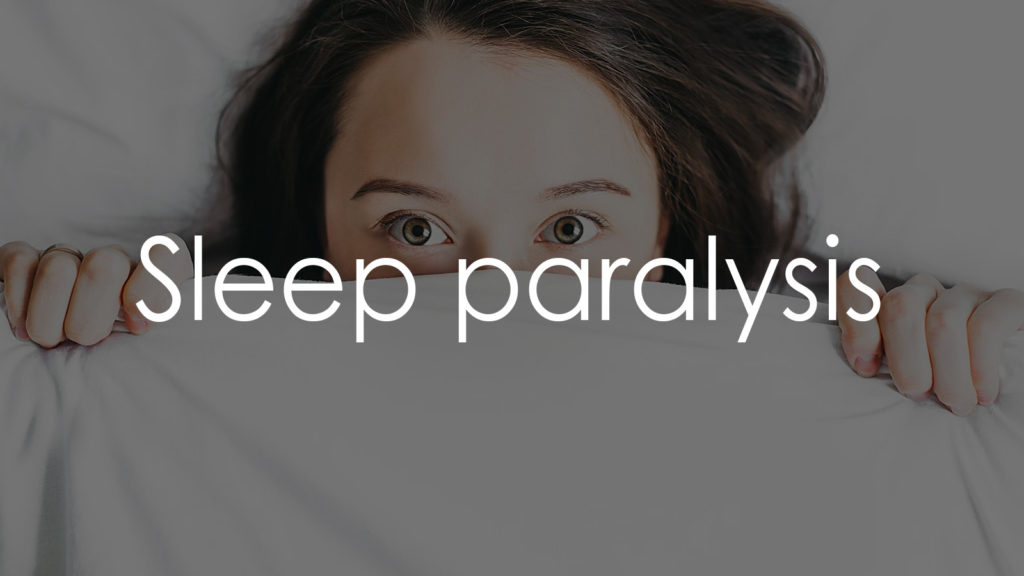Sleep paralysis is a condition where an individual is unable to move or speak while falling asleep or upon waking. It can be an unsettling experience and is often accompanied by vivid hallucinations. Understanding what triggers this phenomenon can help alleviate anxiety and shed light on possible interventions. In this article, we will delve deep into the various causes of sleep paralysis, offering a comprehensive look at both scientific and lifestyle factors that contribute to its occurrence.

Disrupted Sleep Patterns
One of the primary causes of sleep paralysis is an irregular sleep schedule. This can occur due to:
- Shift work: People who work irregular hours, especially night shifts, may experience disruptions in their circadian rhythms, which increases the likelihood of sleep paralysis.
- Jet lag: Frequent traveling across time zones can disturb sleep cycles, leading to an increased risk.
- Insomnia: Difficulty falling asleep or staying asleep can create an imbalance in the sleep cycle, triggering episodes of sleep paralysis.
Disrupting the body’s natural sleep-wake cycle can make it harder for the brain to transition between sleep stages smoothly, leading to paralysis.
Sleep Deprivation
Chronic lack of sleep or consistently poor-quality sleep is another significant factor behind sleep paralysis. When the body is deprived of rest, it may struggle to move smoothly through the different stages of sleep, especially the rapid eye movement (REM) stage where paralysis commonly occurs. The brain may partially awaken from REM sleep, but the body remains immobilized, causing the person to feel stuck in a paralyzed state.
Stress and Anxiety
High levels of stress and anxiety are also closely linked to sleep paralysis. When under stress, the body releases cortisol, which can interfere with sleep patterns. Prolonged stress can prevent the brain from properly regulating the REM stage, leading to a disconnection between the mind’s consciousness and the body’s ability to move. Stress-induced sleep paralysis is common, particularly during periods of heightened emotional turmoil.
Sleep Disorders
Various sleep disorders contribute to sleep paralysis by disrupting normal sleep patterns. Some key conditions include:
- Narcolepsy: A neurological disorder characterized by excessive daytime sleepiness and sudden sleep attacks, narcolepsy often includes symptoms of sleep paralysis. In people with narcolepsy, the boundaries between wakefulness and REM sleep are often blurred, making them more prone to paralysis episodes.
- Sleep apnea: This condition causes breathing interruptions during sleep, leading to fragmented rest. People with sleep apnea may experience sleep paralysis as their sleep stages are repeatedly interrupted.
- Restless legs syndrome: The constant need to move the legs during sleep can fragment rest and increase the likelihood of waking up during REM sleep, leading to episodes of paralysis.
REM Sleep Disruptions
Sleep paralysis most commonly occurs during the REM stage of sleep, where the body naturally enters a state of paralysis to prevent acting out dreams. Any disturbance during REM sleep, such as waking up too quickly, can lead to the sensation of being unable to move. If the brain wakes up before the REM cycle is complete, it can trigger paralysis while the body remains in this immobilized state.
Substance Abuse
The use of certain substances, such as drugs and alcohol, can interfere with sleep architecture. Stimulants, in particular, disrupt REM sleep and may contribute to episodes of sleep paralysis. Alcohol, while initially sedative, can lead to fragmented sleep as it wears off, causing disturbances in the REM stage that heighten the risk of paralysis.
Sleeping Position
Interestingly, research suggests that sleeping on your back (the supine position) may increase the chances of experiencing sleep paralysis. When lying on the back, the airway can become more obstructed, making it harder for the body to breathe naturally. This position has also been linked to an increased likelihood of waking up during REM sleep, where paralysis is most common.
Genetics and Family History
There is evidence to suggest that sleep paralysis may have a genetic component. If a family member experiences sleep paralysis, you may have a higher chance of experiencing it as well. While the exact genes involved have not been identified, studies show that those with a family history of the condition are more likely to report episodes.
Mental Health Conditions
Certain mental health conditions, such as depression, bipolar disorder, and post-traumatic stress disorder (PTSD), are associated with higher rates of sleep paralysis. These conditions often disrupt sleep patterns and lead to fragmented sleep, which can trigger paralysis episodes. In some cases, the vivid and terrifying hallucinations associated with sleep paralysis may be heightened by pre-existing anxiety or trauma.
Hormonal Changes
Hormonal fluctuations, particularly during adolescence, pregnancy, or menopause, can affect sleep quality and increase the risk of sleep paralysis. These changes can disrupt the body’s circadian rhythm and cause imbalances in the sleep cycle, making it easier to experience sleep disturbances.
Conclusion
Sleep paralysis can be triggered by a variety of factors, from lifestyle choices and sleep patterns to genetic predispositions and mental health conditions. Understanding these causes can help individuals take steps to minimize episodes, such as adopting a regular sleep schedule, managing stress, and addressing underlying sleep disorders. While sleep paralysis can be a frightening experience, knowing the potential causes provides a path toward better sleep and peace of mind.